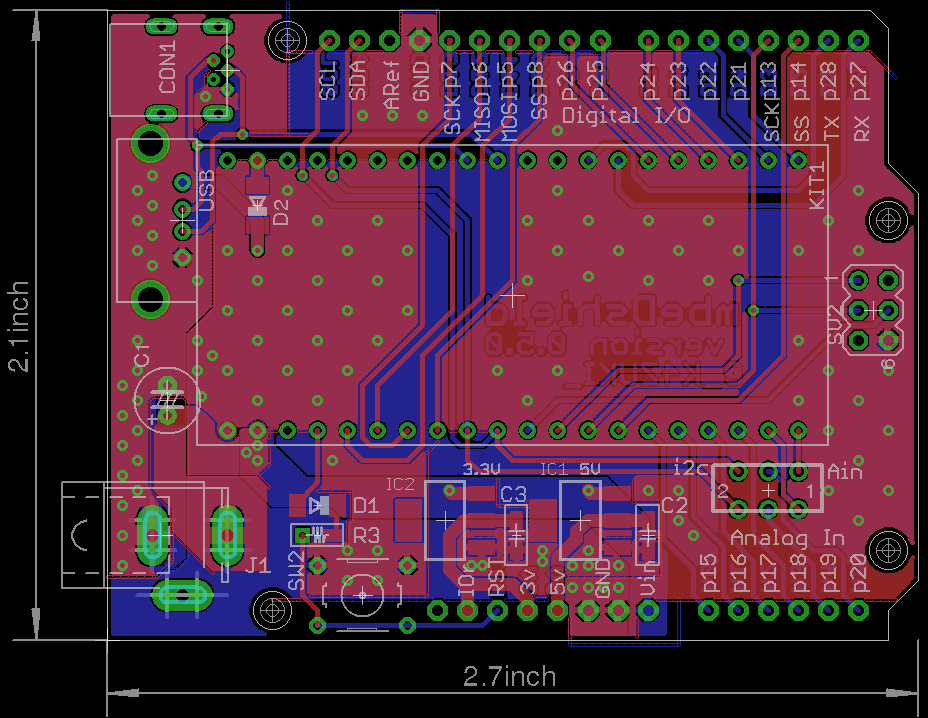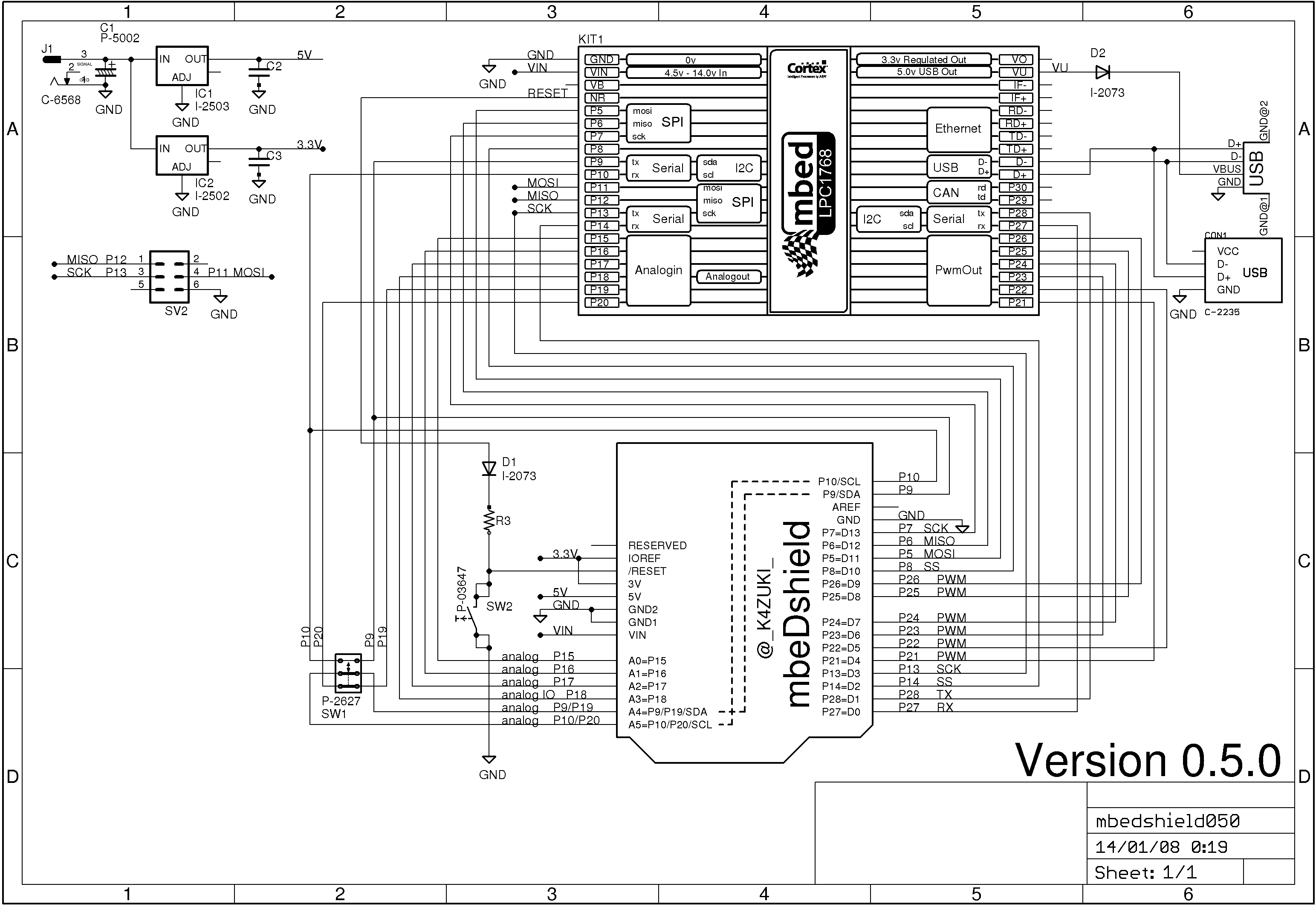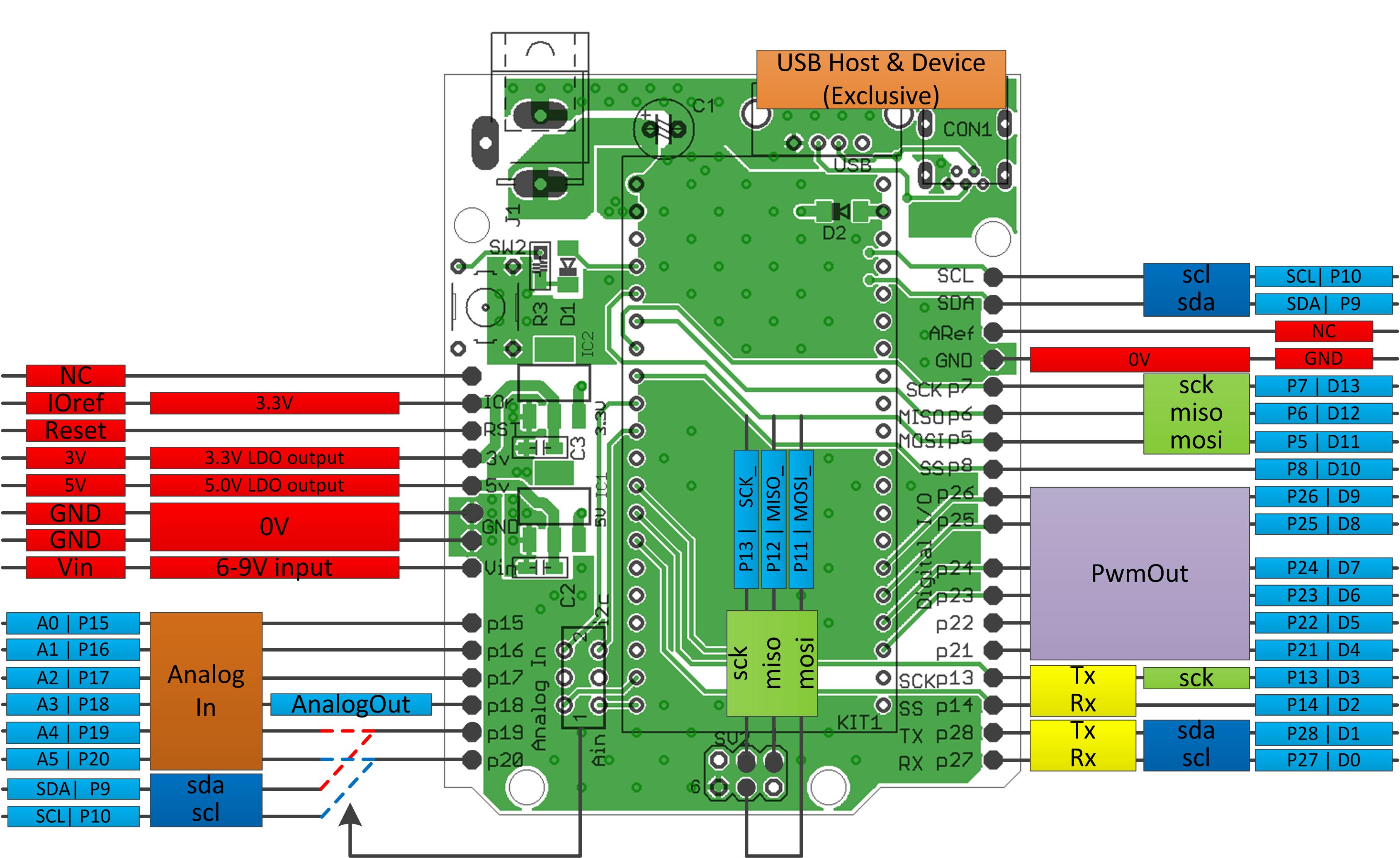The official mbed C/C SDK provides the software platform and libraries to build your applications.
Fork of mbed by
(01.May.2014) started sales! http://www.switch-science.com/catalog/1717/
(13.March.2014) updated to 0.5.0
This is a pin conversion PCB from mbed 1768/11U24 to arduino UNO.
- So if you have both mbed and arduino shields, I guess you would be happy with such a conversion board :)
Photos
- Board photo vvv

- Schematic photo vvv

- Functionality photo vvv

Latest eagle files
PCB >> /media/uploads/k4zuki/mbedshield050.brd
SCH >> /media/uploads/k4zuki/mbedshield050.sch
BIG changes from previous version
- Ethernet RJ45 connector is removed.
- http://mbed.org/components/Seeed-Ethernet-Shield-V20/ is the biggest hint to use Ethernet!
MostALL of components can be bought at Akizuki http://akizukidenshi.com/- But sorry, they do not send parts to abroad
- Pinout is changed!
| arduino | 0.4.0 | 0.5.0 |
|---|---|---|
| D4 | p12 | p21 |
| D5 | p11 | p22 |
| MOSI_ | none | p11 |
| MISO_ | none | p12 |
| SCK_ | none | p13 |
This design has bug(s)
- I2C functional pin differs between 1768 and 11U24.
Fixed bugs here
- MiniUSB cable cannot be connected on mbed if you solder high-height electrolytic capacitor on C3.
- http://akizukidenshi.com/catalog/g/gP-05002/ is the solution to make this 100% AKIZUKI parts!
- the 6-pin ISP port is not inprimented in version 0.4.0
it will be fixed in later version 0.4.1/0.4.2/0.5.0This has beenfixed
I am doing some porting to use existing arduino shields but it may faster if you do it by yourself...
you can use arduino PinName "A0-A5,D0-D13" plus backside SPI port for easier porting.
To do this you have to edit PinName enum in
- "mbed/TARGET_LPC1768/PinNames.h" or
- "mbed/TARGET_LPC11U24/PinNames.h" as per your target mbed.
here is the actual list: This list includes define switch to switch pin assignment
part_of_PinNames.h
USBTX = P0_2,
USBRX = P0_3,
//from here mbeDshield mod
D0=p27,
D1=p28,
D2=p14,
D3=p13,
#ifdef MBEDSHIELD_050
MOSI_=p11,
MISO_=p12,
SCK_=p13,
D4=p21,
D5=p22,
#else
D4=p12,
D5=p11,
#endif
D6=p23,
D7=p24,
D8=p25,
D9=p26,
D10=p8,
D11=p5,
D12=p6,
D13=p7,
A0=p15,
A1=p16,
A2=p17,
A3=p18,
A4=p19,
A5=p20,
SDA=p9,
SCL=p10,
//mbeDshield mod ends here
// Not connected
NC = (int)0xFFFFFFFF
Diff: I2CSlave.h
- Revision:
- 43:e2ed12d17f06
- Parent:
- 27:7110ebee3484
- Child:
- 44:24d45a770a51
--- a/I2CSlave.h Wed Aug 29 12:44:47 2012 +0100
+++ b/I2CSlave.h Fri Oct 26 17:40:46 2012 +0100
@@ -16,39 +16,39 @@
namespace mbed {
-/* Class: I2CSlave
- * An I2C Slave, used for communicating with an I2C Master device
+/** An I2C Slave, used for communicating with an I2C Master device
*
* Example:
- * > // Simple I2C responder
- * > #include <mbed.h>
- * >
- * > I2CSlave slave(p9, p10);
- * >
- * > int main() {
- * > char buf[10];
- * > char msg[] = "Slave!";
- * >
- * > slave.address(0xA0);
- * > while (1) {
- * > int i = slave.receive();
- * > switch (i) {
- * > case I2CSlave::ReadAddressed:
- * > slave.write(msg, strlen(msg) + 1); // Includes null char
- * > break;
- * > case I2CSlave::WriteGeneral:
- * > slave.read(buf, 10);
- * > printf("Read G: %s\n", buf);
- * > break;
- * > case I2CSlave::WriteAddressed:
- * > slave.read(buf, 10);
- * > printf("Read A: %s\n", buf);
- * > break;
- * > }
- * > for(int i = 0; i < 10; i++) buf[i] = 0; // Clear buffer
- * > }
- * > }
- * >
+ * @code
+ * // Simple I2C responder
+ * #include <mbed.h>
+ *
+ * I2CSlave slave(p9, p10);
+ *
+ * int main() {
+ * char buf[10];
+ * char msg[] = "Slave!";
+ *
+ * slave.address(0xA0);
+ * while (1) {
+ * int i = slave.receive();
+ * switch (i) {
+ * case I2CSlave::ReadAddressed:
+ * slave.write(msg, strlen(msg) + 1); // Includes null char
+ * break;
+ * case I2CSlave::WriteGeneral:
+ * slave.read(buf, 10);
+ * printf("Read G: %s\n", buf);
+ * break;
+ * case I2CSlave::WriteAddressed:
+ * slave.read(buf, 10);
+ * printf("Read A: %s\n", buf);
+ * break;
+ * }
+ * for(int i = 0; i < 10; i++) buf[i] = 0; // Clear buffer
+ * }
+ * }
+ * @endcode
*/
class I2CSlave : public Base {
@@ -61,84 +61,78 @@
, WriteAddressed = 3
};
- /* Constructor: I2CSlave
- * Create an I2C Slave interface, connected to the specified pins.
+ /** Create an I2C Slave interface, connected to the specified pins.
*
- * Variables:
- * sda - I2C data line pin
- * scl - I2C clock line pin
+ * @param sda I2C data line pin
+ * @param scl I2C clock line pin
*/
I2CSlave(PinName sda, PinName scl, const char *name = NULL);
- /* Function: frequency
- * Set the frequency of the I2C interface
+ /** Set the frequency of the I2C interface
*
- * Variables:
- * hz - The bus frequency in hertz
+ * @param hz The bus frequency in hertz
*/
void frequency(int hz);
- /* Function: receive
- * Checks to see if this I2C Slave has been addressed.
+ /** Checks to see if this I2C Slave has been addressed.
*
- * Variables:
- * returns - a status indicating if the device has been addressed, and how
- * > NoData - the slave has not been addressed
- * > ReadAddressed - the master has requested a read from this slave
- * > WriteAddressed - the master is writing to this slave
- * > WriteGeneral - the master is writing to all slave
+ * @returns
+ * A status indicating if the device has been addressed, and how
+ * - NoData - the slave has not been addressed
+ * - ReadAddressed - the master has requested a read from this slave
+ * - WriteAddressed - the master is writing to this slave
+ * - WriteGeneral - the master is writing to all slave
*/
int receive(void);
- /* Function: read
- * Read from an I2C master.
+ /** Read from an I2C master.
*
- * Variables:
- * data - pointer to the byte array to read data in to
- * length - maximum number of bytes to read
- * returns - 0 on success, non-0 otherwise
+ * @param data pointer to the byte array to read data in to
+ * @param length maximum number of bytes to read
+ *
+ * @returns
+ * 0 on success,
+ * non-0 otherwise
*/
int read(char *data, int length);
- /* Function: read
- * Read a single byte from an I2C master.
+ /** Read a single byte from an I2C master.
*
- * Variables:
- * returns - the byte read
+ * @returns
+ * the byte read
*/
int read(void);
- /* Function: write
- * Write to an I2C master.
+ /** Write to an I2C master.
*
- * Variables:
- * data - pointer to the byte array to be transmitted
- * length - the number of bytes to transmite
- * returns - a 0 on success, non-0 otherwise
+ * @param data pointer to the byte array to be transmitted
+ * @param length the number of bytes to transmite
+ *
+ * @returns
+ * 0 on success,
+ * non-0 otherwise
*/
int write(const char *data, int length);
- /* Function: write
- * Write a single byte to an I2C master.
+ /** Write a single byte to an I2C master.
+ *
+ * @data the byte to write
*
- * Variables
- * data - the byte to write
- * returns - a '1' if an ACK was received, a '0' otherwise
+ * @returns
+ * '1' if an ACK was received,
+ * '0' otherwise
*/
int write(int data);
- /* Function: address
- * Sets the I2C slave address.
+ /** Sets the I2C slave address.
*
- * Variables
- * address - the address to set for the slave (ignoring the least
- * signifcant bit). If set to 0, the slave will only respond to the
- * general call address.
+ * @param address The address to set for the slave (ignoring the least
+ * signifcant bit). If set to 0, the slave will only respond to the
+ * general call address.
*/
void address(int address);
- /* Function: stop
- * Reset the I2C slave back into the known ready receiving state.
+ /** Reset the I2C slave back into the known ready receiving state.
*/
void stop(void);
